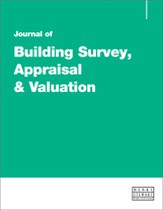Professional Indemnity Insurance (PII) and risk management for surveyors and valuers
Abstract
February 2016 – many surveying firms will be benefitting from an upturn in work as the UK property market continues to enjoy a period of relative prosperity. Whilst speculation about interest rates abounds, a glance at newspaper headlines could lead many to believing that we have returned to the heady days of the pre-downturn market with lending and property prices reaching record highs. Hopefully risk will not follow suit and hopefully surveyors have learnt from past mistakes. Businesses must not be tempted to underprice, take on too much work, agree to overly onerous contractual conditions or to use the inexperienced to counteract a short fall in capacity. This paper will try to explain why.
The full article is available to subscribers to the journal.
Citation
Vigus, Emma and Crossingham, Robert (2016, March 1). Professional Indemnity Insurance (PII) and risk management for surveyors and valuers. In the Journal of Building Survey, Appraisal & Valuation, Volume 4, Issue 4. https://doi.org/10.69554/GWYV6274.Publications LLP
